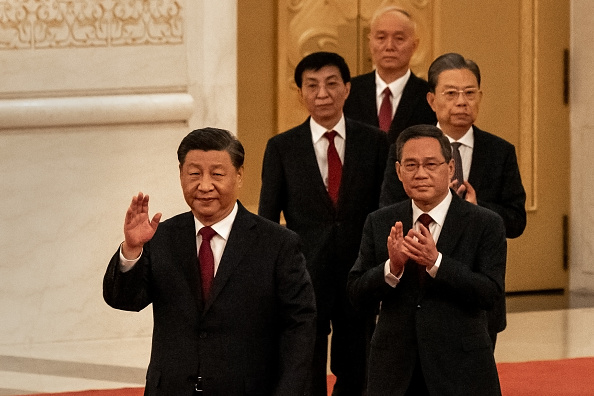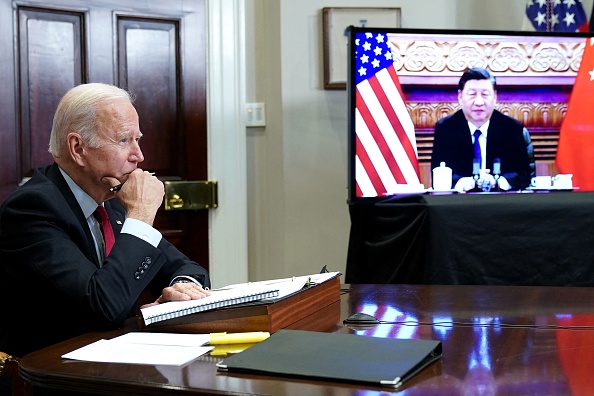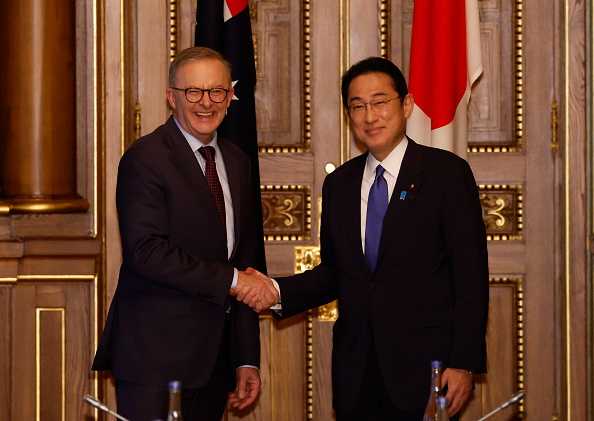
 Third Time's the Charm
Third Time's the CharmDuring the twentieth congress of the Chinese Communist Party, Chinese President Xi Jinping secured an unprecedented third five-year term as the party's general secretary, cementing his position as the nation's most powerful leader since Mao Zedong. The Central Committee of the Chinese Communist Party elected Xi as its general secretary, while Xi promised to "work diligently in the performance of our duties to prove worthy of the great trust of our party and our people."
Xi also revealed the new lineup for the Politburo Standing Committee, the Communist Party's most powerful leaders. The new appointees to the Politburo Standing Committee include a number of close allies to Xi: Li Qiang, who worked under Xi when they were local officials in Zhejiang Province; Ding Xuexiang, a senior aide to Xi; and Cai Qi, the party secretary of Beijing whose ties to Xi go back decades.
In accepting the role, Xi emphasized strengthening the development of basic research and indigenous innovation to drive the Chinese economy and protect national security. He emphasized China's "self-reliance in technology," the need for "strengthening supply-chain reliability, resilience, and security," and China's "national security." In addition, this year, Xi called for a "diversified and stable international economic system" and reiterated his ambition for China to exert more influence in setting international rules and standards.
The new leadership lineup also pointed to greater emphasis on relations with the U.S. With Foreign Minister Wang Yi joining the new Politburo, and Qin Gang, China's ambassador to the U.S., being added to the central committee, there is an indication China may want to focus more on addressing the competitive relationship with the United States.
Read more in "Party Congress Signals a New Beginning," by Xu Hongcai, Deputy Director of the Economic Policy Commission.
 Seeking Cooperation
Seeking CooperationAs the COP27 negotiations are set to commence in Egypt next week, the lead U.S. climate envoy John Kerry has urged China to return to the negotiating table on the climate crisis to restart stalled global progress on cutting greenhouse gas emissions.
After Nancy Pelosi, the speaker of the House of Representatives visited Taiwan earlier this year, negotiations between the U.S. and China were largely halted. However, while the failure of the world's two biggest emitters to cooperate has created problems for global climate action, Kerry has signaled that the two countries are slowly finding opportunities to work together on issues ranging from curbing methane, combating deforestation and accelerating the green transition.
"We've sent each other a few messages trying to figure out how we might be able to resume" talks, U.S. Special Presidential Envoy for Climate John Kerry said during an event sponsored by the Council on Foreign Relations. And "there's been communication about what would help the process."
Prior to the cessation in conversations, climate negotiations between China and the U.S. were improving and looking more promising than they had done for years. At the COP26 UN climate summit in Glasgow last November, the two countries announced a bilateral pact to work on clean technology, methane and other ways of reducing emissions.
President Xi has echoed the sentiment that China and the United States must "find ways to get along" to safeguard world peace and development, with a defense spokesperson saying that if the U.S. wishes to strengthen military communications, it should "respect China's interests and major concerns."
 Increased Security
Increased SecurityU.S. allies Japan and Australia signed a new security cooperation pact last week aimed at countering China. The agreement builds on a pact signed in 2007 that officials note is in response to a significantly altered regional security environment.
The declaration discusses cooperation between the two countries, primarily covering military interoperability, intelligence, cybersecurity, operations in space, law enforcement, logistics and protecting telecommunications.
The pact was signed in Perth on Saturday, as the two leaders, Japanese Prime Minister Fumio Kishida and his Australian counterpart Anthony Albanese, met to discuss defense and energy security.
"This landmark declaration sends a strong signal to the region of our strategic alignment," said Albanese.
Chinese analysts have also responded to the agreement. "Both Japan and Australia are trying to hype the China threat and attempting to pull in extra-territorial countries to their small clique," said Da Zhigang, a director at Heilongjiang Provincial Academy of Social Sciences, to Chinese state media the Global Times. He also emphasized that "this puts regional countries on the alert and threatens regional stability."
Prepared by China-US Focus editorial teams in Hong Kong and New York, this weekly newsletter offers you snap shots of latest trends and developments emerging from China every week, while adding a dose of historical perspective.
- 2022-10-21 United as Steel
- 2022-10-14 Party Time
- 2022-10-07 Elections Incoming
- 2022-09-30 Hot Intrigue
- 2022-09-23 Global Gridlock
- 2022-09-16 Injecting Stability
- 2022-09-09 Cutting Edges
- 2022-09-01 A Win for Global Business
- 2022-08-26 A Heavy Price
- 2022-08-19 Risky Business
- 2022-08-12 Backtracking
- 2022-08-05 Cross-Strait Outrage
- 2022-07-29 Playing with Fire
- 2022-07-22 Nixonian Flexibility
- 2022-07-15 List Diplomacy
- 2022-07-08 Easing Tariffs, Not Tensions
- 2022-07-01 Getting Tough
- 2022-06-24 Tools in the Box
- 2022-06-17 Unprecedented Oversight
- 2022-06-10 Squaring Off